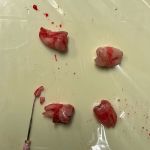
The Importance of Hydrating Your Mouth
Your mouth is constantly working throughout the day, whether it's speaking, eating, or simply breathing. Maintaining a hydrated and healthy mouth is essential for good oral health. Dehydration in the mouth can lead to various oral health problems, including dry mouth, bad breath, and increased risk of tooth decay. In this article, we will explore the best ways to keep your mouth hydrated and healthy, along with practical tips that can easily be incorporated into your daily routine.
1. Drink Plenty of Water Throughout the Day
One of the simplest and most effective ways to keep your mouth hydrated is to drink plenty of water. Water is essential for your overall health, and it plays a crucial role in maintaining proper saliva production. Saliva is a natural defense mechanism that helps wash away food particles and harmful bacteria, keeping your mouth clean and healthy. Dehydration can reduce the flow of saliva, which leads to dry mouth and can contribute to the development of cavities and gum disease.
Make it a habit to sip water regularly throughout the day. Carrying a water bottle with you ensures that you stay hydrated no matter where you are. Drinking water after meals can also help rinse away food particles and reduce the chances of plaque buildup.
2. Keep Your Saliva Flowing with Healthy Snacks
In addition to drinking water, you can stimulate your saliva production by eating certain foods. Snacking on healthy, hydrating foods like fruits and vegetables can help keep your mouth moist and encourage saliva flow. Apples, cucumbers, carrots, and celery are excellent choices because they are crunchy and contain a high water content. These foods help stimulate the production of saliva, which keeps your mouth moist and helps with digestion.
Additionally, chewing sugar-free gum can also boost saliva production. Sugar-free gum not only helps keep your mouth moist but also prevents cavities by neutralizing acids that can damage tooth enamel.
3. Use Mouthwash to Maintain Oral Moisture
While drinking water and eating hydrating foods can help, using a mouthwash designed to keep your mouth moist can further enhance your oral health. Look for mouthwashes that are specifically formulated for dry mouth, as they contain ingredients that help maintain moisture levels and promote saliva production. Avoid mouthwashes with alcohol, as they can dry out your mouth even more.
Using a mouthwash after brushing your teeth can also provide a fresh feeling and help prevent bad breath. Some mouthwashes contain antibacterial agents that help fight germs and maintain a healthy balance of bacteria in your mouth.
4. Avoid Dehydrating Substances
To maintain a healthy and hydrated mouth, it's important to avoid substances that can contribute to dehydration. Caffeine, alcohol, and tobacco are all known to reduce saliva production and can leave your mouth feeling dry. If you consume coffee, tea, or alcohol, make sure to balance it with extra water to counteract the dehydrating effects.
Smoking or using tobacco products can also worsen dry mouth and increase the risk of gum disease and tooth decay. Quitting smoking is one of the best steps you can take for both your overall and oral health.
5. Maintain Good Oral Hygiene Practices
Keeping your mouth hydrated also involves maintaining good oral hygiene practices. Brushing your teeth at least twice a day with fluoride toothpaste and flossing daily will help prevent plaque buildup and reduce the risk of gum disease. Using a soft-bristled toothbrush and brushing gently helps preserve the natural moisture of your gums and teeth, while also preventing irritation and discomfort.
Regular visits to the dentist for check-ups and cleanings are essential for monitoring the health of your mouth. If you experience persistent dry mouth or other oral health issues, it's important to consult with your dentist, as these could be signs of an underlying condition that needs attention.
6. Consider Using a Humidifier
Dry air can contribute to dry mouth, especially during the winter months when indoor heating can cause the air to become excessively dry. To combat this, consider using a humidifier in your bedroom or living area. A humidifier helps add moisture to the air, preventing your mouth and throat from becoming too dry while you sleep.
In addition to using a humidifier, breathing through your nose instead of your mouth can also help reduce dryness. If you're prone to snoring, using a nasal strip or seeking medical advice for sleep apnea can help prevent mouth breathing during the night.
7. Stay on Top of Your Health
Your overall health plays a significant role in maintaining a hydrated and healthy mouth. Certain health conditions, such as diabetes, can affect saliva production and contribute to dry mouth. Medications, including antihistamines and decongestants, can also cause dehydration as a side effect. If you're experiencing chronic dry mouth, it may be a sign of an underlying health issue, and it's important to speak with your healthcare provider to find a solution.
Maintaining a balanced diet rich in vitamins and minerals, such as Vitamin A and Vitamin C, can support your body's natural functions, including saliva production. Staying healthy overall contributes to the optimal functioning of your oral and body systems.
8. Try Natural Remedies for Mouth Hydration
There are also several natural remedies you can try to keep your mouth hydrated. Aloe vera juice is a natural anti-inflammatory and can help soothe and moisturize the mouth. Drinking small amounts of aloe vera juice can also help reduce mouth dryness and promote oral health.
Another natural remedy is coconut oil. Swishing a small amount of coconut oil around in your mouth, also known as oil pulling, can help moisturize your mouth and promote overall oral hygiene. Coconut oil has antibacterial properties that help eliminate harmful bacteria in the mouth while keeping it moist.
Conclusion: Keep Your Mouth Hydrated and Healthy Every Day
Keeping your mouth hydrated is key to maintaining good oral health. By following these simple and effective tips, such as drinking plenty of water, eating hydrating foods, using mouthwash, and avoiding dehydrating substances, you can ensure that your mouth stays healthy and comfortable. Remember that regular oral hygiene practices, like brushing and flossing, are essential in keeping your teeth and gums in top shape. If you ever experience persistent dry mouth, consult with your dentist to address any potential health issues that may be affecting your mouth's hydration.







 Floral Vale Periodontics and Implants, P.C.5.0 (180 review)
Floral Vale Periodontics and Implants, P.C.5.0 (180 review) Sky Family Dental Group4.0 (16 review)
Sky Family Dental Group4.0 (16 review) Pura Vida Orthodontics5.0 (24 review)
Pura Vida Orthodontics5.0 (24 review) LAX DENTAL and ORTHODONTICS4.0 (107 review)
LAX DENTAL and ORTHODONTICS4.0 (107 review) Armendariz Family Dentistry - Bethany Armendariz5.0 (310 review)
Armendariz Family Dentistry - Bethany Armendariz5.0 (310 review) Ichimura Dave DDS0.0 (0 review)
Ichimura Dave DDS0.0 (0 review) The Importance of Oral Health Education During Pregnancy for a Healthy Pregnancy
The Importance of Oral Health Education During Pregnancy for a Healthy Pregnancy Best Tips for Brushing Your Teeth Properly for Healthy Gums: Essential Techniques for Oral Health
Best Tips for Brushing Your Teeth Properly for Healthy Gums: Essential Techniques for Oral Health Why Skipping Dental Checkups Can Lead to Bigger Oral Health Problems
Why Skipping Dental Checkups Can Lead to Bigger Oral Health Problems Advantages of Porcelain Dental Restorations
Advantages of Porcelain Dental Restorations How Can Diabetes Cause Tooth and Gum Problems? Preventing and Managing Oral Health Issues
How Can Diabetes Cause Tooth and Gum Problems? Preventing and Managing Oral Health Issues Healthy Habits for Promoting Good Oral Health and Hygiene: Tips for a Healthy Smile
Healthy Habits for Promoting Good Oral Health and Hygiene: Tips for a Healthy Smile